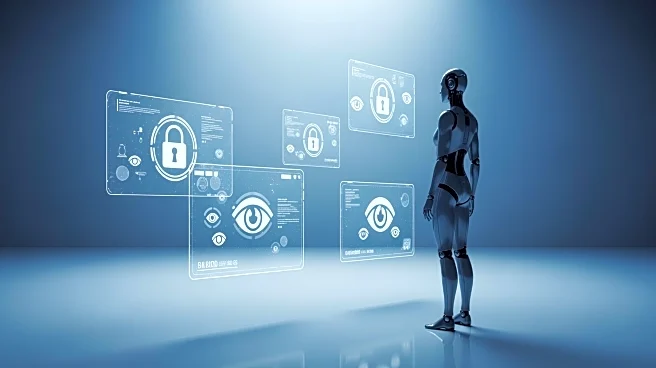What's Happening?
Teleoperated humanoid robots, such as 1X's Neo, are being introduced into homes, promising assistance with household chores. These robots are controlled in real-time by human operators, which has sparked privacy concerns. Critics, including tech reviewer
MKBHD, have raised issues about these robots acting as surveillance units, allowing operators to view private spaces through high-definition feeds. Despite the unsettling nature of this setup, proponents argue that teleoperation is a digital extension of existing practices where people invite service providers into their homes. The concept of teleoperation is not new, as it is already used in remote drone piloting and warehouse management. The introduction of these robots could create new job opportunities for remote operators, although full autonomy remains a distant goal.
Why It's Important?
The introduction of teleoperated humanoid robots into homes represents a significant shift in domestic technology, with implications for privacy and employment. While these robots offer convenience, they also raise concerns about surveillance and data privacy, as operators can view intimate spaces. This development could lead to new job categories, providing employment opportunities in a landscape where AI is perceived as a threat to jobs. The slow progress towards full autonomy suggests that teleoperation will remain a key model, allowing humans to guide robots and potentially easing the transition to more autonomous systems. The design and appearance of these robots are crucial for mass adoption, as they need to appear friendly and non-threatening to be accepted by consumers.
What's Next?
As teleoperated robots become more common, companies will need to address privacy concerns and improve the design to make them more appealing to consumers. The development of autonomous systems will continue, but teleoperation will likely remain a significant aspect of robot functionality for the foreseeable future. Companies may focus on creating jobs for remote operators and refining robot designs to enhance user comfort and acceptance. The gradual integration of robots into homes will require cultural and societal adjustments, as people become accustomed to living alongside machines.
Beyond the Headlines
The ethical implications of teleoperated robots include privacy concerns and the potential for surveillance, which could lead to legal challenges. The design of these robots plays a crucial role in their acceptance, as they need to appear friendly and approachable to overcome the uncanny valley effect. The slow pace of autonomy development highlights the complexity of creating machines that can operate independently in diverse environments. This transition period offers an opportunity to explore the balance between human oversight and machine autonomy, potentially reshaping the future of domestic technology.














